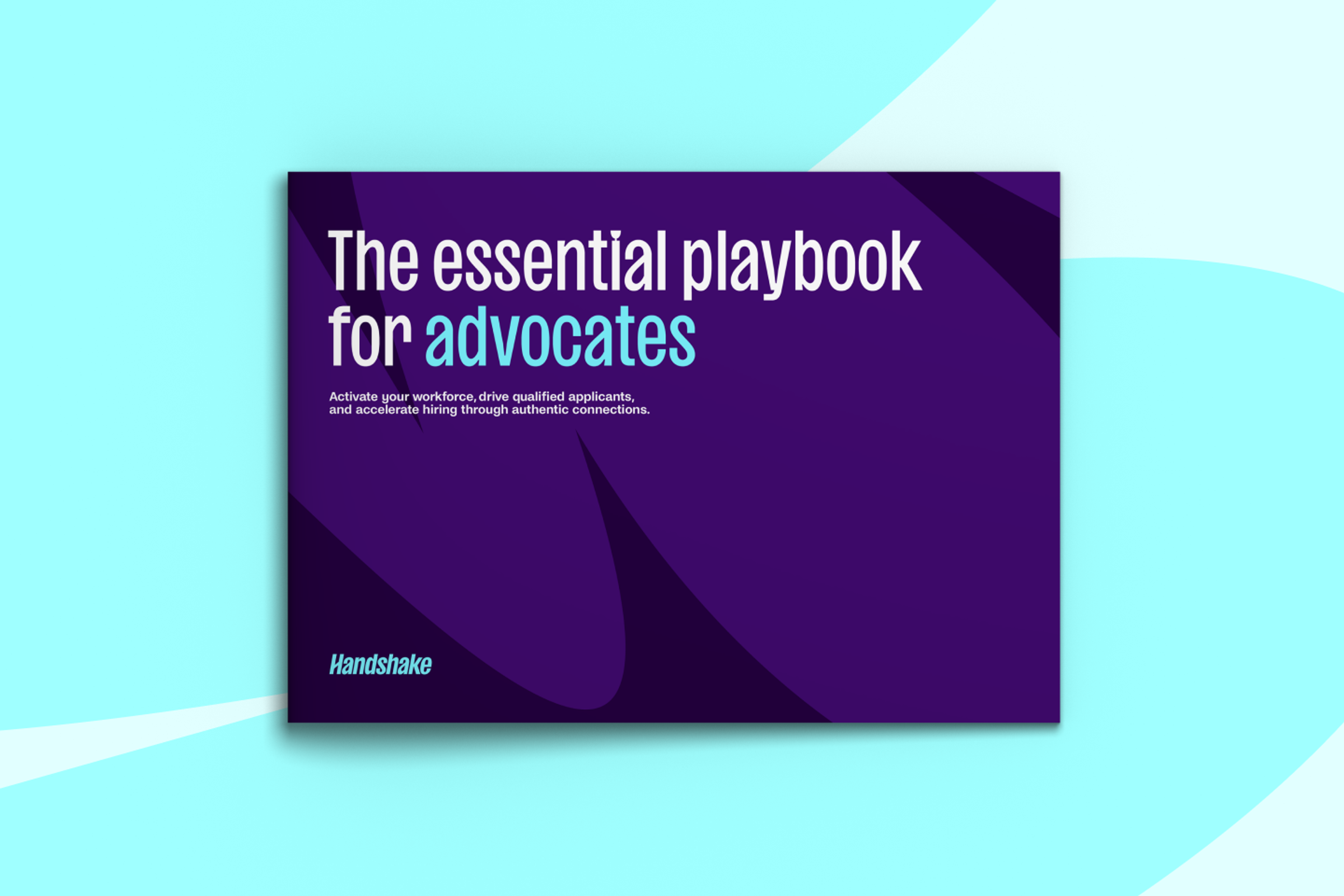Recruiting and hiring early talent offers plenty of advantages for employers. But to reap the benefits, you don’t just need to attract early talent—you need to keep them.
Mentorship is a powerful way to engage students and recent graduates, upskill early career talent, and deliver the supportive employee experience they’re looking for. And when 83% of Gen Zers say a workplace mentor is crucial for their career but only half of workers report having one, a mentorship program also helps you stand out.
From interns to new hires, here’s what you need to know to ensure mentorship is a winning ingredient in your early talent programs.
4 reasons why mentorship matters
Entering the workforce for the first time is intimidating. A mentor serves as a trusted resource for early talent to turn to when they encounter questions and challenges or need some sage advice.
“I had great mentors during my internship who coached me with a vision of what I could do… With the guidance of my mentors, my project was approved within 4 weeks or 5 weeks of starting my internship.”
Maria, Operations intern turned full-time hire at Amazon, a Handshake Early Talent Award winner
But while the benefits to students and early career professionals are obvious, a mentorship program isn’t just advantageous for talent. It’s a boost for employers too. Here’s why.
1. Meet the demand for career development
Gen Z isn’t just trying to get their foot in the door—they’re ready to charge through it. This generation is hungry for career development and advancement, with 63% of Gen Z saying that “developing advanced skills in your field” is essential to their definition of career success.
That means early talent is looking for more than a place to work. They want employers that will invest in their continued learning and development, with 87% of undergrads saying that learning and development benefits are either important or essential when evaluating a job opportunity.
With 79% of Gen Z undergrads say mentorship is either a moderately or very valuable learning and development benefit, a mentorship program provides the level of hands-on support and personalized guidance early career candidates are looking for.
2. Support and enforce your DEIB efforts
Mentorship is also a helpful supplement to your other diversity, equity, inclusion, and belonging (DEIB) efforts. Research shows that the most successful workplace diversity programs are those with higher levels of continued engagement and accountability, and mentoring programs fit that bill.
Mentorship can be especially important for women and other underrepresented groups, so formalizing a program gives early talent a chance to not only learn and grow but also be championed within your organization.
3. Improve employee engagement and retention
While mentorship is an impressive benefit to tout in your recruitment efforts, these offerings are more than just a marketing tactic—they’re a key piece of your employee experience. One survey conducted by the Gallup Center on Black Voices found that mentors and sponsors are crucial to shaping the employee experience, especially when organizations purposefully put them in place.
And that positive experience translates to higher engagement and better retention. A study by the Association for Talent Development found that when companies offer mentorship programs, employee engagement and retention increase by as much as 50%.
4. Set your employer brand apart
Gen Z pays close attention to your employer brand when determining where to start their careers, and they’re looking for more than flexible schedules, work-life balance, and resonant values. They want employers who will actively support them in acquiring new skills, with 76% of Gen Zers saying that they see learning as key to their career advancement.
Highlighting your mentorship program as part of your employer brand shows early talent that you invest in their learning and advancement in tangible and tailored ways.
How to implement a mentorship program for early talent
Getting mentorship right involves more than pulling names out of a hat and randomly pairing people up. Here are six strategies you can use to foster a mentorship culture and help early talent feel as supported as possible.
1. Infuse mentorship into your existing early talent programs
It’s tempting to think of mentorship as only pertinent for existing employees. However, incorporating aspects of mentorship into your early talent programs and recruitment efforts can show Gen Z candidates that you walk the walk when it comes to learning and development. Take some inspiration from these ideas:
- Offer panel discussions, skill-building experiences, and other learning events to college students at your partner schools to engage them with your brand and demonstrate your commitment to learning.
- Partner with a university or other educational institution to offer a mentorship and development program to relevant college students, much like Handshake Early Talent Award winner Kiewit does with its Kiewit Design-Build Program.
- Build upon your internship program by introducing a mentorship element and partnering interns with more established and experienced team members.
All of the above show early talent that you’re serious about their growth and advancement before they’ve even officially joined your organization for the long haul.

Discover Handshake Advocates
Are you currently engaging non-recruiting team members in your early talent recruiting? Learn how to launch an advocates program on Handshake.
Learn more2. Prioritize effective employee onboarding
Onboarding is a delicate time. It’s when new employees are carefully evaluating whether or not the new job will deliver what was promised. And at the same time, they’re likely overwhelmed as they get up to speed in their new positions.
Needless to say, it’s a time when employees benefit from more hands-on guidance and support. Matching them with an onboarding mentor gives them a friendly resource they can approach with questions and concerns (think of it as the workplace version of the summer camp “buddy system”).
The route you take here can vary depending on your goals. For example, matching a new hire with someone experienced in their specific position will give them greater on-the-job expertise and insights about career growth. However, matching them with someone outside of their immediate function or department can help them get a better grasp of company culture and norms, as well as valuable exposure to different areas of the business.
Either way, new hires reap the benefits of having a trusted expert to turn to when they need it. That fuels their sense of connection to your organization which in turn boosts their confidence and performance, with research showing a 56% increase in job performance when employees feel like they belong.
3. Provide opportunities for upskilling
Ultimately, successful mentorship is focused on upskilling: equipping early talent with the know-how they need to excel in their roles. Offering additional learning opportunities—like courses and training—is an effective supplement to your early career mentorship program.
Role-specific courses are the most valuable learning and development benefit for Gen Z, even ranking ahead of other perks like tuition reimbursement, learning stipends, and paid time off to invest in learning.
Plus, these opportunities allow early talent to connect with other relevant experts and pursue their own mentors if they want to. That salesperson who leads a public speaking workshop might be the perfect career mentor for that software engineer who wants to improve their interpersonal skills—and they might have never crossed paths had it not been for that employer-sponsored educational offering.
4. Infuse mentorship into your ERGs
Organizations that are committed to diversity and inclusion know how important employee resource groups (ERGs) are for fostering a sense of camaraderie and belonging.
But while McKinsey research shows that 66% of ERG members say these groups are effective at employee community building, they fall short when it comes to career advancement (with only 40% of members saying their ERGs are effective in this area).
Adding a mentorship element can help address that shortfall, much like Handshake Early Talent Award winner Comcast did with its ERG Mentorship Program. Mentorship pairings participate in ERG-sponsored events but also have separate conversations about career development and relevant challenges. This gives new hires and early talent the chance to lean on the expertise of someone who they already share some common ground with.
5. Go beyond mentorship to sponsorship
While early talent mentorship matters, research shows that sponsorship is even more impactful. What’s the difference? A mentor candidly shares knowledge and information with a less-experienced employee. But a sponsor goes beyond that to actively champion growth and advancement. That could look like:
- Making an introduction or connection
- Offering access to learning or career opportunities
- Providing a recommendation or referral
As Gallup explains it, “a sponsor opens the door to opportunities for another employee, while a mentor supports and guides an employee so that they can open the door for themselves.”
That same Gallup research shows that sponsorship is much less common than mentorship. So, a standout mentorship program goes beyond educating early talent to advocate for them—something that’s particularly important for women and people of color who join your organization.
6. Try reverse mentorship
It’s easy to think of mentorship as a top-down arrangement, where an experienced professional offers advice to somebody who’s more green. But reverse mentorship—where early talent advises leaders or other established employees—is a model that’s picking up steam.
It’s another area where you have the flexibility to be creative with your approach. For example, you could assign interns to teach managers what early talent looks for in a work environment and a leader. Or, you could have a group of interns present to the C-suite about what they took away from their internships as well as what about the program could be improved.
Those are opportunities for early talent to build their skills, forge connections, and increase their exposure to the organization, while also making them feel recognized and appreciated for their contributions.
Show early talent what’s possible with meaningful mentorship
Recruiting and hiring early talent is a competitive advantage for companies. But while you might know what it takes to get them through the door, do you know how to keep them engaged and excited about the possibilities with your organization?
That’s where mentorship can be so powerful. Early career mentoring gives talent personalized support and hands-on guidance as they start their careers, all while fueling their sense of ambition and enthusiasm.
After all, when it comes to learning how to achieve success, early talent already knows the best place to turn: experienced professionals who paved the way before them.
